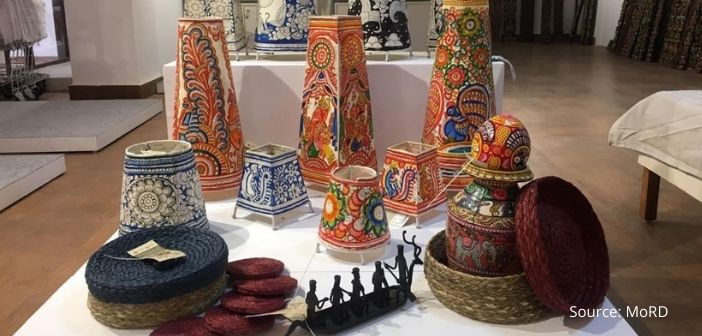Earthenware is back in style, thanks to e-commerce, there is a growing market for functional pottery items like pots, jugs, and pans that bring back the tradition in modern homes and kitchens. Similarly, the carpet sector could also gain immensely through the digital reach of e-commerce.
Thanks to technology, the access to markets is not limited to participating in Hunar Haats or Crafts Fairs alone. While this trend indicates positive growth of the organized industry, the question remains – are we ready to tap the market potential, both domestic and international?
Most probably not! This is because the handicrafts and carpet sector is predominantly unorganized and heavily dependent on traditional knowledge and skills that are informally acquired and restricted to certain families and clusters. And, the knowledge and skills of the artisans and craftspersons which are quite unique, in most cases, remains unrecognized, barring a few who get to showcase their products in fairs and exhibitions.
- A potter making earthenware – from mixing the clay to packaging the product goes through many stages such as molding, firing, glazing, finishing, and quality check. He or she might be following traditional processes and meet the requirements at a certain NSQF level but does not have a formal qualification.
- A carpet maker might be using different techniques to weave the carpet, right from sourcing the material to processing it, then designing, weaving, checking the quality and packaging, may not be aware of the importance or value of a formal certificate.

These are typical examples of how craftspersons have been working for ages. But today, with the changing economic environment and digital disruption, formal recognition and certification become a necessity for various reasons like filling in the skill or knowledge gaps, upskilling, and providing opportunities for upward mobility through access to various support systems.
Since this sector is primarily rural-based and deeply rooted in the cultural ethos of the region, we need to have a different approach towards the promotion of their crafts and showing them ways to create sustainable livelihood and a profitable business.
A few points demand our attention:
- How do we capture informal learning and document it for the benefit of a larger population? ( for transferring the knowledge and skills to the younger generation of people who want to learn the craft)
- How do we recognize what has been informally learned over generations through assessments and certification, aligned with NSQF levels?
- What are the ways in which we can promote the message of continuous learning for upskilling and reskilling to meet the changing demands of the markets?
Recognition of Prior Learning (RPL) in Handicrafts and Carpet industry
Recognition of Prior Learning (RPL) has been an integral component of the PMKVY scheme from the Government of India to recognize the skills and knowledge informally picked up through systematic assessment and certification. However, the nature of the industry may pose a few challenges in creating awareness about RPL, its importance, and the implementation process.
One of the key issues we face here pertains to mobilizing the craft clusters to enroll for RPL either voluntarily or through their enterprises. Getting support from the entrepreneurs who operate in this sector is the first step towards the successful implementation of RPL programs. Making them understand the benefits of RPL could be the first step in this direction.
Benefits of RPL to the handicrafts and carpet industry
- Formal recognition of learning motivates, encourages, and boosts morale. It brings in a sense of pride since it acknowledges the potential and contribution of the artisans and craftspersons, besides opening access to markets, finance, and other forms of support for entrepreneurs.
- It also paves the way for upskilling and mainstreaming them in the formal sector to avail the benefits of a government certification – whether it means enrolling for a higher education program, becoming a trainer, or launching a business.
- Assessment and certification of the existing levels of skills and knowledge as per NSQF also indicate certain gaps that need to be filled to reach the desired NSQF levels. This can be achieved through immediate training or through short-term bridge courses.
- Participation in craft fairs and exhibitions in domestic and international markets often requires formal certificates. RPL is a valid and authentic source to get certified by the Sector Skill Council and NSDC.
- RPL is effective in driving the significance of continuous and lifelong learning to enhance knowledge and skills for improving productivity and adopting the latest tools and techniques.
Also Read: How HCSSC promotes skill development in handicraft and carpet sector – https://nationalskillsnetwork.in/how-hcssc-promotes-skill-development-in-handicraft-and-carpet-sector/
Improving and upgrading the competencies of the unorganized workforce acquired greater immediacy in the context of initiatives like ‘Vocal for Local’ and ‘Aatmanirbhar Bharat’ aimed at empowering the local economy. An effective beginning towards this could be made through strategic promotion and implementation of RPL by formally valuing the existing competencies and enhancing them to the desired levels of NSQF.





